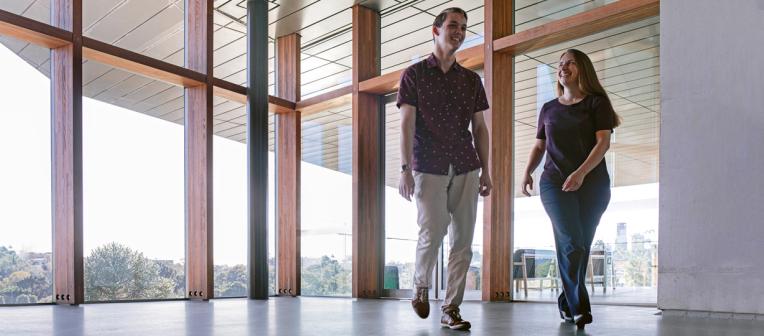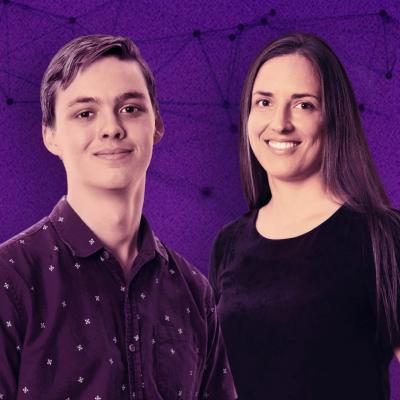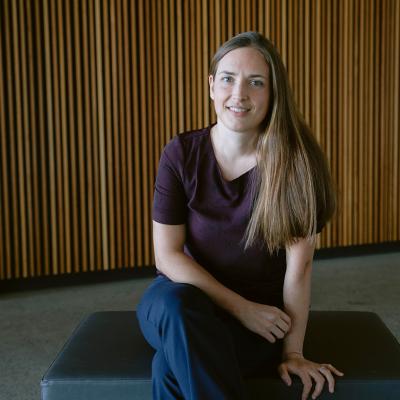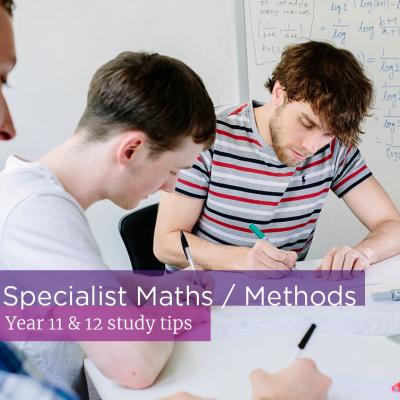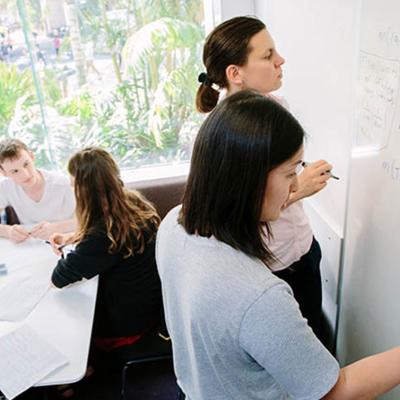Considering studying mathematics at university? You may have lots of questions. We're here to help you find answers.
- Why study mathematics?
- What skills do you learn while studying mathematics at university?
- What's a day in the life of a mathematics student look like?
- Is a mathematics degree useful?
We've interviewed a UQ student and academic to find out. Sean is studying a dual degree in mathematics and science, and Dr Sara Davies (née Herke) is a senior lecturer in mathematics. They’ve teamed up to answer some of your questions and uncover how UQ can give you the skills you need to face the future, even when you don't know exactly what the future will look like.
Let's find out if mathematics sounds like the study area for you.
What has been the most unexpected thing you have been happy to discover at UQ?
Sean: For me, one of the things that I was not expecting was the dynamic between lecturers and students. You go from school where you're sitting in a classroom and you call them Mr or Mrs or Sir, or whatever it may be, and then university lecturers and tutors will jump in, and they've got like 20 years’ experience – they’ve literally got a PhD, they've done ground-breaking research – and they're like: ‘Hi guys, I'm Dave’. The lectures are so happy to just talk to you about anything. They're really welcoming and open with their time. I wasn't expecting them to be so happy for you to just organise a time to chat one on one to explain some of the coursework.
What is it about the UQ’s approach that makes us the most employable graduates in the state?
Sara: I think for one thing we give students good, challenging problems to work on during their degree. By seeing a problem that at the outset, looks really challenging, and then you make some progress on that and you realise ‘Oh, hold on, I can tackle that’, then you gain that confidence to take a look at any other problem, whether it be in industry or somewhere else and actually make progress there and not be afraid. The other thing I think we will do really well is focus on communication. I think it's really incredible to see our students getting opportunities to practice their science communication and mathematics communication, and I think that's an incredibly valuable skill.
What does a day in the life of mathematics student look like?
Sean: It really depends day to day because you've got lectures, you've also got tutorials and sometimes practicals or times where you’re working in computer labs. Because I'm doing science as well and looking at animals, I also have time in actual wet labs sometimes where we might be looking at animal skulls or doing a bit of microbiology. Normally I wake up, come to uni and spend anywhere between three and five hours doing some uni work, then go home and then get a chance to do whatever else I need to do, including sometimes study the work that we're doing. But you regularly have two or three hours of lectures, and then the tutorials will cover the work we've done in the lectures.
Sara: And how much work would you say you spend on self-study outside of the directed lecture and tutorials?
Sean: They say you should spend I think it's 10 hours per subject per week, which comes to about 40 hours, which is manageable, and normally that also includes like lecture and practical or tutorial times, so it's somewhere between two and three hours per subject per week. Sometimes it's more because you've just got to focus on this assignment or you've got this exam coming up, so you have to do a little bit more, sometimes a little less.
Sara: Is that self-directed part of the degree sort of challenging for you or is that something that you recognise as a skill to develop?
Sean: It's definitely a skill to develop. It's something I had to get better at, at the start. I wasn't particularly bad at it, but I hadn't sort of got into the flow of it. I think for me, it was really freeing because I could choose what I was doing with my life.
What opportunities do your students have to get hands on experience in our industry?
Sara: In mathematics, we have industry placement and we also have summer and winter research programs, and summer school and winter school. So I think those give really good examples where students can get into industry, or even work with an academic on a research problem over a semester and just see how that works for them.
What are the most valuable skills you've learned as part of your degree?
Sean: One of them is communication – it's something that perhaps we're lacking in the sciences. While we're able to have a discussion about maths things, and you, Sara, are able to tell me at my level, it can be difficult to just bring that out to your grandma who did high school maths and she was great at that. But she's missing three years that we've just built upon our knowledge. It’s about understanding your audience. You’ve got to tailor it to who is listening, and I think that’s a focus in first year.
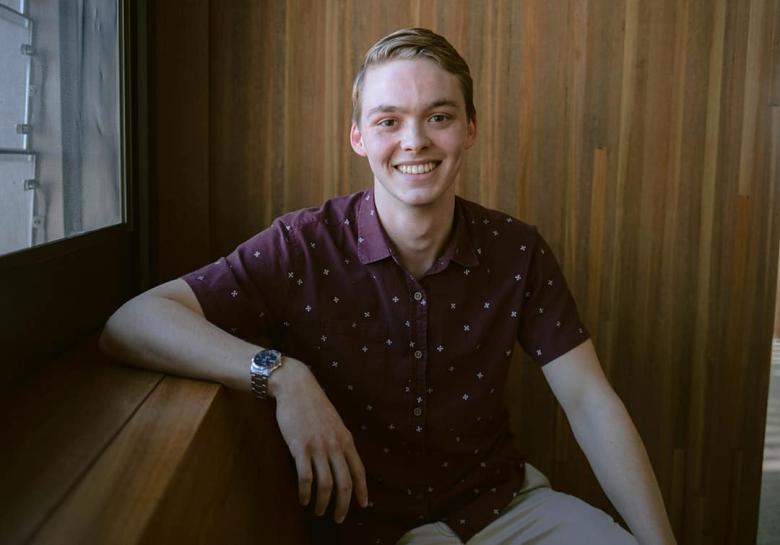
How do you prepare students for the future when we don't know what the future looks like?
Sara: I think that being able to take a hard problem or a complicated, slightly ambiguous problem, and then not feel scared of it – that skill is just so broadly applicable. No matter what future directions you go in, that skill will serve you. I think mathematics training really gives you that sort of foundational ability to take a hard problem and then make it into a formal problem, and make progress on that. I think that way of thinking makes you unafraid to tackle new things.
How does the way you learn at UQ give you the skills that you need to face an unknown future?
Sean: I think one of the good things for the vast majority of lectures I've had, is that they've not only taught the content they have to get through, but there's also that other side where they know what is needed in the actual job, which is sometimes different from the specific coursework you're taking. I've had some of the best recommendations on what are the really valuable skills that you're going to need through life.
In my third-year statistics courses, the lectures talk about the theory and the precise mathematics. But then, almost every lecture, they'll say, right, so we're going to go into Matlab, or maybe some computer programming software, and we're going to do an example. And it doesn't really matter the numbers, but they show – this is what you're doing and so when you get a different problem, you just go straight into the software, start doing it, and it does incredibly complex things incredibly quickly.
Sara: It does. But having that foundational understanding means that when you run the program, you understand what's going on, rather than just running it and saying ‘I believe this output’. The output might be wrong, based on what you've done. So I think that understanding the fundamental mathematics that underpins those programs is an incredibly useful set of knowledge base, but also the skill of being able to ask the program to do something for you. That's a really incredible skill.
If you were employing the next mathematics graduate, who would you be looking for?
Sara: Somebody who has strong quantitative foundations. But also a curiosity, and someone who is actually passionate about a question, and can communicate their curiosity. If somebody is very passionate about what they're looking at and can communicate that to others, I think that's an incredibly valuable skill, whether it be for writing a paper or working in industry or working with students. The quantitative side is really important – having that basic foundation, but it's probably not as important to be like, 100% marks everywhere, as it is to balance with the passion and the curiosity.
What do you think employers in your industry are looking for and how do you think UQ has equipped you with these skills?
Sean: I think there's two big ones. You've got to be able to work in a multi-disciplinary team. So, often you'll be working in a team, and you will be the math specialists that help other people do their jobs in some other field. It might be finance, might be marketing, it might be material science. It could be engineering, and they'll often come to you with their problems.
And this is where the second part comes in: getting to the essence of the problem. They'll talk to you in their language about what's going on, we need the solution to this and you need to be able to pick out the maths parts, and then do your maths work that you're the specialist on. And then often it's helpful to present it back to them in the way they’re used to, because they might just tune out if you start going for the math side of it. You don't need to focus on the math in this situation, because you're confident and you've done that – you can just say this is what we can do, this is where we go.
Sara: Do you feel like you've developed that skill? To pull out the essence of a problem and then also to communicate it to different sorts of teams?
Sean: Definitely. On more than one occasion, in more than one course, we've had a maths-style problem – it might be talking about the statistics around an experiment – and they'll be very clearly assessing how you can interpret it, or they might even go one step further and say, “you have to present this to a board of directors, how would you get this message across?”. So they very specifically look at assessing your communication skills and they teach that and help you with that in tutorials.
If you can give me one piece of advice that would set me apart as a job candidate, what would it be?
Sara: I would say, breadth of experience as well as depth. So, as well as studying the mathematics and all the foundations that you are working on and thinking about, as you say, you like zoology. The fact that you've gained that breadth and you've looked at the way somebody else might work in say, an interdisciplinary field or a multidisciplinary field, that breadth will make you a stronger candidate, I believe.
Sean: You said breadth and depth, is there a balance that you need to be favouring one or the other?
Sara: I would say depth is probably very important if you want to be a specialist, but you want a sprinkling of that breadth, otherwise you become too centred on only what you do, and you don't see how other people view that. That breath is really important to gain somewhere, even if it's in a first year interdisciplinary course, or if it's in a dual degree, or if it's in an industry placement. It doesn't have to be in your coursework – it can be through like UQ life things, UQ teams or volunteering – certainly that gives you a breadth beyond just the rigour of your study, I think.
What makes a good student and are they the same things that make a good job candidate?
Sara: They probably are quite similar things. I would say a good attitude towards the problems that you're working on, and the ability to schedule your time as well. And that's something that I think students really maybe lack at the beginning, but really do develop quite quickly.
A good student is somebody who can manage their time, is unafraid to take on problems, and they’re unafraid to sort of talk to other people when they get stuck, or talk to their course coordinator. That’s a really good thing to do even though it sounds scary, because in the real world – in industry or in any job – if you are stuck on something, you should talk to your boss or talk to your colleagues about whatever it is that you're stuck on. I think that lack of fear to communicate with other people and to sort of push forward on a problem is a really useful skill that's hard to write down on a resume. You get some of that from the breadth of what you study, and also just through a degree.
What have you learned about yourself since you began your studies at UQ?
Sean: In first year, I knew I was good at science and I knew I was good at maths. I'd done well enough at school to be able to get into the program at UQ. But I didn't really know what kind of science I wanted to look at. In high school, I'd focused mainly on chemistry and physics. But I took a biology course and realised that that's actually really interesting. It wasn't actually until I did a second year course that I was like wow I really, really love animals! I just enjoy spending time with animals, and it's nice to be able to go out for a hike or go for a walk in the park and you can see an animal and you understand how that works, and I've done that in those courses. Although I knew I liked animals. It hadn't really clicked with me that you can do this – you can study this and this can be part of your life.
Explore undergraduate programs in mathematics or discover what it's really like to study other programs at UQ.

